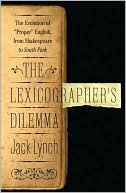List Books » The Lexicographer's Dilemma: The Evolution of 'Proper' English, from Shakespeare to South Park
Category Books
- Fiction Books & Literature
- Graphic Novels
- Horror
- Mystery & Crime
- Poetry
- Romance Books
- Science Fiction & Fantasy
- Thrillers
- Westerns
- Ages 0-2
- Ages 3-5
- Ages 6-8
- Ages 9-12
- Teens
- Children's Books
- African Americans
- Antiques & Collectibles
- Art, Architecture & Photography
- Bibles & Bible Studies
- Biography
- Business Books
- Christianity
- Computer Books & Technology Books
- Cookbooks, Food & Wine
- Crafts & Hobbies Books
- Education & Teaching
- Engineering
- Entertainment
- Foreign Languages
- Game Books
- Gay & Lesbian
- Health Books, Diet & Fitness Books
- History
- Home & Garden
- Humor Books
- Judaism & Judaica
- Law
- Medical Books
- New Age & Spirituality
- Nonfiction
- Parenting & Family
- Pets
- Philosophy
- Political Books & Current Events Books
- Psychology & Psychotherapy
- Reference
- Religion Books
- Science & Nature
- Self Improvement
- Sex & Relationships
- Social Sciences
- Sports & Adventure
- Study Guides & Test Prep
- Travel
- True Crime
- Weddings
- Women's Studies
The Lexicographer's Dilemma: The Evolution of 'Proper' English, from Shakespeare to South Park »

Authors: Jack Lynch
ISBN-13: 9780802717009, ISBN-10: 0802717004
Format: Hardcover
Publisher: Walker & Company
Date Published: October 2009
Edition: (Non-applicable)
Author Biography: Jack Lynch
Jack Lynch is a professor of English at Rutgers University and a Johnson scholar, having studied the great lexicographer for nearly a decade. He is the editor of Samuel Johnson’s Dictionary and the author of Samuel Johnson’s Insults and Becoming Shakespeare. He lives in Lawrenceville, New Jersey.
Book Synopsis
For language buffs and lexicographers, copy editors and proofreaders, and anyone who appreciates the connection between language and culture—the illuminating story of “proper English.”
In its long history, the English language has had many lawmakers—those who have tried to regulate, or otherwise organize, the way we speak. The Lexicographer’s Dilemma offers the first narrative history of these endeavors, showing clearly that what we now regard as the only “correct” way to speak emerged out of specific historical and social conditions over the course of centuries.
As literary historian Jack Lynch has discovered, every rule has a human history, and the characters peopling his narrative are as interesting for their obsession as for their erudition. The struggle between prescriptivists, who prescribe a correct approach, and descriptivists, who analyze how language works, is at the heart of Lynch’s story. From the sharp-tongued satirist Jonathan Swift, who called for a governmentsponsored academy to issue rulings on the language, and the polymath Samuel Johnson, who put dictionaries on a new footing, to John Horne Tooke, the crackpot linguist whose bizarre theories continue to baffle scholars; Joseph Priestley, whose political radicalism prompted riots; and the ever-crotchety Noah Webster, whose goal was to Americanize the English language—Lynch brings to life a varied cast as illuminating as it is entertaining.
Grammatical “rules” or “laws” are not like the law of gravity, or laws against theft or murder—they’re more like rules of etiquette, made by fallible people and subject to change. Charting the evolution of English, Jack Lynch puts today’s debates—whether about Ebonics in the schools or split infinitives in the New York Times—in a rich historical context, and makes us appreciate anew the hard-won standards we now enjoy.
The Washington Post - Carolyn See
This delightful look at efforts through the centuries to define and control the English language turns out to be a history of human exasperation, frustration and free-floating angst. People tend to go nuts around the English language. Of course, most of us are nuts anyway, but the language is always there, in the ether, or staring at us from a page, and if we're feeling particularly cranky, it never fails to provide a ready excuse for us to fly off the handle.
Table of Contents
Introduction 1
1 Vulgarities of Speech: Homo Sapiens Learns to Speak 9
2 The Age in Which I Live: John Dryden Revises His Works 27
3 Proper Words in Proper Places: Jonathan Swift Demands an Academy 49
4 Enchaining Syllables, Lashing the Wind: Samuel Johnson Lays Down the Law 71
5 The Art of Using Words Properly: Joseph Priestley Seeks Genuine and Established Principles 94
6 The People in These States: Noah Webster Americanizes the Language 116
7 Words, Words, Words: James Murray Surveys Anglicity 139
8 The Taste and Fancy of the Speller: George Bernard Shaw Rewrites the ABCs 163
9 Direct, Simple, Brief, Vigorous, and Lucid: Henry Watson Fowler Shows the Way 186
10 Sabotage in Springfield: Philip Gove Stokes the Flames 207
11 Expletive Deleted: George Carlin Vexes the Censors 229
12 Grammar, and Nonsense, and Learning: We Look to the Future 253
Acknowledgments 277
Notes 279
Bibliography 297
Index 315
Subjects
 English-language Reference
English-language Reference  English Grammar
English GrammarReference
 English-language Reference
English-language Reference  English Lexicography
English LexicographyNonfiction
 Reference
Reference  English-language Reference
English-language Reference
